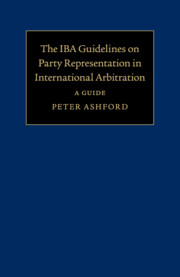Book contents
- Frontmatter
- Contents
- Dedication
- Preface and dedication
- Cases
- About the IBA Arbitration Committee
- The Guidelines
- Definitions
- Guidelines 1–3
- Guidelines 4–6
- Guidelines 7–8
- Guidelines 9–11
- Guidelines 12–17
- Guidelines 18–25
- Guidelines 26–27
- Appendix 1 Extract from the LCIA Arbitration Rules 2014 and Annex to the LCIA Rules
- Appendix 2 Interaction of IBA Rules with major professional conduct rules
- Appendix 3 Interaction of IBA Rules with major institutional rules
- Index
Preface and dedication
Published online by Cambridge University Press: 05 July 2016
- Frontmatter
- Contents
- Dedication
- Preface and dedication
- Cases
- About the IBA Arbitration Committee
- The Guidelines
- Definitions
- Guidelines 1–3
- Guidelines 4–6
- Guidelines 7–8
- Guidelines 9–11
- Guidelines 12–17
- Guidelines 18–25
- Guidelines 26–27
- Appendix 1 Extract from the LCIA Arbitration Rules 2014 and Annex to the LCIA Rules
- Appendix 2 Interaction of IBA Rules with major professional conduct rules
- Appendix 3 Interaction of IBA Rules with major institutional rules
- Index
Summary
This book goes to the publishers as the 2015 International Arbitration Survey by White & Case/Queen Mary University of London is published. It finds international arbitration as popular as ever and the international arbitration community in rude health. Respondents to the survey felt that there was adequate regulation but nevertheless called for more ‘micro-regulation’ of third-party funding, tribunal secretaries and conduct of arbitrators. The survey also found something of a ‘due process paranoia’ causing increased cost and delay.
It is certainly not for this book to suggest that parties and tribunals routinely formally adopt the Guidelines. Rather, the adequacy of existing regulation is endorsed, as is the notion that parties and tribunals should craft a process around the true issues that require to be determined: a process that meets the parties’ objectives of time and cost (to the extent that any consensus is possible after the dispute has arisen) and, in doing so, becomes a pragmatic and cost-efficient process, being guided as necessary by the Guidelines and other soft law.
One of the inherent benefits of arbitration – the ability to craft a bespoke process to meet the needs of the situation – has the potential to be lost in the tidal wave of soft law and, as the survey terms it, ‘due process paranoia’. It may be a forlorn hope that those inherent benefits will again come to the fore – but we can dream.
The structure of the book is to set out the Guidelines (in bold) and Committee Comments (in italics) with a discussion following each section. The divisions within the original Guidelines and Committee Comments do not permit individual Guidelines (as opposed to the original grouping) to be commented upon; and, in any event, the original grouping provides a logical split. Within the discussion, subheadings are inserted to assist the reader.
I gratefully acknowledge the help, support and guidance from my partners at Fox Williams and from friends and colleagues who have debated issues with me (whether knowingly for this book or not). Special thanks go to my colleagues, Sabrina Janzik, and Jeremy McKeown at Fox Williams, whose valuable work on the tables in the Appendices and the case index respectively, and for other parts of the text, has been most helpful. As usual, however, all errors and omissions are mine alone.
Information
- Type
- Chapter
- Information
- The IBA Guidelines on Party Representation in International ArbitrationA Guide, pp. ix - xPublisher: Cambridge University PressPrint publication year: 2016
